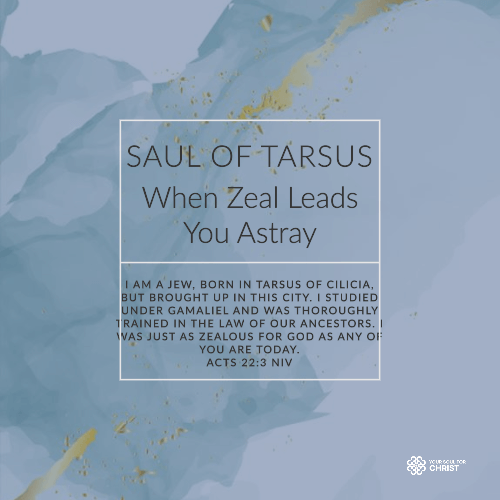“I am a Jew, born in Tarsus of Cilicia, but brought up in this city. I studied under Gamaliel and was thoroughly trained in the law of our ancestors. I was just as zealous for God as any of you are today. I persecuted the followers of this Way to their death, arresting both men and women and throwing them into prison, as the high priest and all the Council can themselves testify. I even obtained letters from them to their associates in Damascus, and went there to bring these people as prisoners to Jerusalem to be punished.
Acts 22:3-5 NIV
Our introduction to the person of Saul was in the stoning of Stephen. In Acts 7:57-58; 8:1, we see the extent Saul and his cohort went to in order to stop people’s belief in Jesus. Saul held on dearly to the ‘faith’ that he received from his ancestors. He was unflinching in what he learnt. His steadfastness and zeal did not shake because he believed his actions were right. Moreover, Saul’s zeal was marked by an intense dedication to the Jewish law and traditions. It was driven by a sincere belief that he was defending the purity of his faith.
dragged him out of the city and began to stone him. Meanwhile, the witnesses laid their coats at the feet of a young man named Saul… And Saul approved of their killing him.
Acts 7:58; 8:1 NIV
Let us look at the descent of Saul. Saul of Tarsus was a Jew of the tribe of Benjamin, born in the city of Tarsus but raised in Jerusalem, Judea. Tarsus was a free city in the Roman province of Cilicia, and Saul’s parents had become citizens of Rome. Thus, by birth, Saul also had Roman citizenship. He trained in Torah (biblical studies and law) under the most respected rabbi of that time, Gamaliel. Saul considered himself to be zealous for God. He was a Pharisee.
Although Saul was a tentmaker by trade, he was like the prosecutor of the law for the Sanhedrin. After his involvement with Stephen’s death, Saul set out to destroy the Messianic community, also known as The Way at that time. He relentlessly went throughout Jerusalem, “entering house after house, he dragged off men and women and committed them to prison” on suspicion of their belief in Jesus as the Messiah. Saul was not content to conduct his inquisition in Jerusalem alone but sought to extradite believers from Damascus across two borders to be tried and sentenced in Jerusalem as well. So, it is safe to say that Saul committed himself to the course he learned from his teachers.
Then some Pharisees and teachers of the law came to Jesus from Jerusalem and asked, “Why do your disciples break the tradition of the elders? They don’t wash their hands before they eat!” Jesus replied, “And why do you break the command of God for the sake of your tradition?
Matthew 15:1-3 NIV
How did Saul get to this point? Saul received a dogged followership of tradition. These traditions had nothing to do with faith in Jesus, and the Pharisees and teachers of the law continued to push that agenda. No nation or person can be greater than her teachers. The teachers no longer knew the Lord of the Law. All they knew was the law, which could not produce righteousness in anyone. The law of the Lord became degenerated to the law of their ancestors. The law lost its meaning and significance to them because it couldn’t bring any form of righteousness.
This is what Saul received and ran with. Saul’s fervour led him to persecute early Christians, whom he saw as a threat to Judaism. His actions, fueled by misguided righteousness, resulted in violence and suffering. Zeal can be a powerful motivator for good. However, to what end is your zeal? Has your Christian Faith not become the faith of our ancestors? Has it not become a common thing to you? It is hard for your zeal to bring out something good if you are at loggerheads with God. Check your fervency. Is it God or religion?
